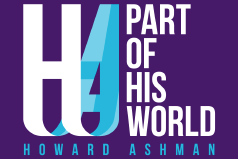Success
In 1982, the 92nd Street Y hosted an interview with a few theater luminaries. They’re all talented, relatively new guys on the block, with relatively recent hits. People like Maury Yeston (Nine) and Jimmy Kirkwood (A Chorus Line) and Howard Ashman. With a poster of Little Shop behind his head, Howard looks intense and solemn and maybe a little uncomfortable. Little Shop had been around for less than a year. It was a certified smash but no one knew how long it would run or how popular it would become. Just a few months before this interview, my husband Ron had made a bet with Howard that the show would still be running a year later, in August of 1983. Howard thought it wouldn’t – of course. Howard lost the bet and won the race, Little Shop ran at the Orpheum for five more years.
Still, none of us, even uncharacteristically optimistic Ron, knew that the show would have such legs.
You never really know how a show or a film is going to be received. Which is why actors and directors and playwrights live in a vortex of hope, desire and denial. It’s fine while you still have relative youth. Howard was thirty-two when Little Shop opened. He’d had some minor success but not enough to live well... or even throw a good party...on. His home was a small walk up on Christopher Street with no sink in the bathroom.
He did freelance on the side, sometimes for me, sometimes for our friend Nan or his former boss in publishing, Harriett. For a while, I worked for a toy company called Mego and if you can get your hands on their catalog from 1978 or so featuring the Cher doll with costumes by Bob Mackie(!) you’ll find some of Howard Ashman’s unsigned, earliest professional work. Scour enough used bookstores and you might also find a copy of Mandrake the Magician – a novelization of a best-forgotten TV movie.
There was also a teleplay about a middle-class African-American family called The Spurgeons, there was a rewrite of the libretto for The Vagabond King, there was Howard’s own play, The Confirmation and his first musical with Alan Menken, God Bless You, Mr. Rosewater. Not to mention the workshop production of Nine at the O’Neill (see the posted video for Maury Yeston’s take on Howard’s contributions).
We all start out in a maelstrom of hope and false starts. Is success a matter of never saying, “I’m done?” Or is it foolish to keep pushing against all odds? Or maybe success is simply different for all of us. I think Howard would have been okay with success being the accolades of his peers and the ability to get his shows up and running. I know he liked the goodies that came with success…who wouldn’t... but I don’t think that it was his definition or his guiding star.
In this video, Howard was at the beginning – not of his career, that had already started – but of his roller coaster of success.
It was a great moment in time, for Howard and for all of us who loved him. Yes, the scourge of AIDS had already begun, friends and lovers had already been lost, but we were all still young and healthy. We didn’t know, we didn’t know.

